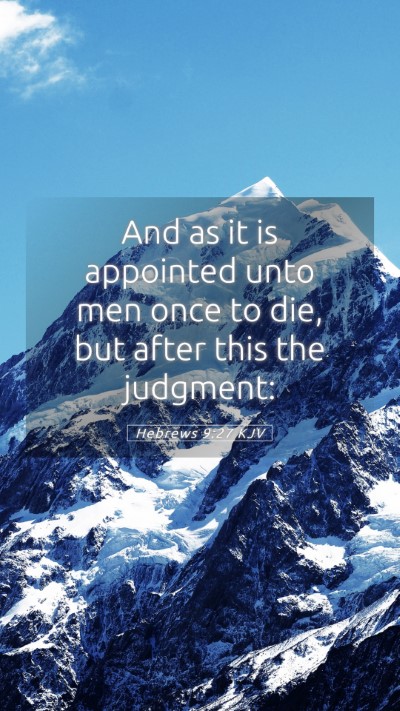Bible Verse Explanation: Hebrews 9:27
Verse: "And as it is appointed unto men once to die, but after this the judgment." (Hebrews 9:27)
This verse captures a profound aspect of humanity's experience and destiny. The author of Hebrews succinctly positions the inevitability of death and the certainty of subsequent judgment, a theme that resonates throughout Scripture.
Understanding the Verse
The verse serves as a reminder that death is a universal appointment for all mankind, and it emphasizes the reality that after death, individuals will face judgment. The interpretation of this verse can be explored through various commentaries:
Insights from Matthew Henry
Matthew Henry highlights the inevitable nature of death that every person must confront. He emphasizes that it is a singular event; we die once, aligning with the notion that life is not a series of reincarnations or repeated chances. He further elaborates that this death is not merely physical but carries spiritual implications, leading into a divine judgment.
Insights from Albert Barnes
Albert Barnes points out that the reference to judgment signifies a moral accountability before God. He explains that the certainty of judgment following death underscores the importance of living a life that aligns with God’s will. Barnes also notes that this judgment will be universal, affecting all individuals without exception, thereby reinforcing the significance of personal conduct and faith during one's lifetime.
Insights from Adam Clarke
Adam Clarke delves into a more theological reflection on the afterlife, suggesting that this scripture warns of both the reality of death and the solemnity of facing God's judgment. He contrasts the notion of having multiple lives with the definitive nature of life and its conclusion in human experience, ultimately highlighting the need for readiness to meet divine judgment through faith in Christ.
Moral and Spiritual Implications
The combination of these insights conveys a strong message regarding the significance of living a purposeful and faithful life. Understanding this verse encourages individuals to reflect on their actions, repent from wrongdoing, and seek a relationship with God through Jesus Christ, as faith becomes the pathway to face judgment with hope rather than fear.
Cross References
- Job 14:1-2: Describes the fleeting nature of human life.
- Hebrews 9:24: Indicates that Christ entered the heavenly sanctuary to intercede for humanity.
- Romans 14:10-12: Affirms that we will stand before God's judgment seat.
- Matthew 25:46: Discusses the eternal destiny following judgment.
- Revelation 20:12: Describes the great white throne judgment.
Application in Life
Reflecting on Hebrews 9:27 encourages believers to think deeply about how they live their lives. It serves as a clarion call for an authentic faith, righteous living, and an awareness of eternal consequences. Embracing this understanding creates urgency in sharing the Gospel and living out Christ’s love, ensuring readiness for the inevitable judgment that follows death.
Concluding Thoughts
In summary, Hebrews 9:27 encapsulates critical Bible verse meanings that challenge us to contemplate death and judgment in a manner that transforms how we engage with both our spiritual walk and our interactions in the world. As individuals and members of bible study groups, let us seek to dive deeper into the understanding of Scripture and its applicability to our lives.
Further Study
For deeper insights into this verse and others, consider utilizing bible study tools and bible study guides. Engaging in online bible study can also provide community feedback and diverse perspectives, enriching your scripture analysis.


